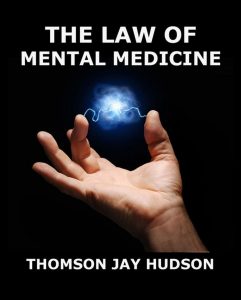The Law Of Mental Medicine – Thomas Jay Hudson
The object of this book is, primarily, to assist in placing mental therapeutics on a firmly scientific basis, and incidentally to place within the reach of the humblest intellect the most effective methods of healing the sick by mental processes. Part I. contains nothing new to the scientific world, except, perhaps, the method of treatment. It pertains solely to the psychological principles of mental medicine. In Part II. the fact is for the first time recognized that no hypothesis can possibly embrace a complete science of mental therapeutics that fails to take cognizance of those facts of physiology and histology which pertain to the subject-matter.
Format: Paperback.
The Law Of Mental Medicine
ISBN: 9783849672089.
Available at amazon.com and other venues.
Therapeutic ideas in New Thought (from Wikipedia):
Divine Science, Unity Church, and Religious Science are organizations that developed from the New Thought movement. Each teaches that Infinite Intelligence, or God, is the sole reality. New Thought adherents believe that sickness is the result of the failure to realize this truth. In this line of thinking, healing is accomplished by the affirmation of oneness with the Infinite Intelligence or God.
John Bovee Dods (1795–1862), an early practitioner of New Thought, wrote several books on the idea that disease originates in the electrical impulses of the nervous system and is therefore curable by a change of belief. Later New Thought teachers, such as the early 20th century author, editor, and publisher William Walker Atkinson, accepted this premise. He connected his idea of mental states of being with his understanding of the new scientific discoveries in electromagnetism and neural processes.
While the beliefs that are held by practitioners of the New Thought movement are similar to many mainstream religious doctrines, there have been concerns raised among scholars and scientists about some of the views surrounding health and wellness that are perpetuated by the New Thought movement. Most pressing is the New Thought movement’s rejection of empirically supported scientific theories of the causes of diseases. In scientific medicine, diseases can have a wide range of physical causes, from abnormalities in genes and in cell growth that cause cancer, to viruses, bacteria, and fungi that cause infections, to environmental toxins that can damage entire organ systems, human physical diseases are caused by physical issues. While it has been empirically supported that the psychological and social health of a person can influence their susceptibility to disease (e.g., stress can suppress immune function which increases risk of infection), mental states are not the cause of human disease, as is claimed by the New Thought movement.
Equally concerning is the New Thought movement’s emphasis on using faith and mental states as treatments for all human disease. While it has been supported that the use of relaxation therapy and other forms of alternative health practices are beneficial in improving the overall well-being of patients suffering from a wide variety of mental and physical health conditions (e.g., cancer, post-traumatic stress disorder), these practices are not effective in treating human disease alone, and should be undertaken in conjunction with modern medical therapies that have empirical support. This rejection of scientifically supported theories of disease and disease treatment is worsened by the New Thought movement’s assertion that mental states, attitudes, and faith in New Thought are the sole determinants of health.
The New Thought movement has received criticism akin to that levied against the holistic health movement that in claiming that sickness is caused by a person’s attitudes, mental states, and faith, it is easy to place blame on patients for not adopting a correct attitude, thought processes, and/or lifestyle. Blame can have powerful psychological effects – with stress and isolation seen in victim blaming being the largest issues that arise and the most concerning in terms of effect on patients’ health. Further, holding beliefs that health and disease is controlled by faith in a higher power can create an external locus of control (i.e., believers may feel as though they themselves cannot prevent disease, and that any illness or disorder that they encounter is an act of the higher power’s will). This external locus of control can create learned helplessness in believers which has been shown to exacerbate mental and physical health conditions via several mechanisms – including reduced incidence
(The text of the last section was taken from a Wikipedia entry and is available under the Creative Commons Attribution-ShareAlike License.)
Publisher’s Note: This book is printed and distributed by Createspace a DBA of On-Demand Publishing LLC and is typically not available anywhere else than in stores owned and operated by Amazon or Createspace.

